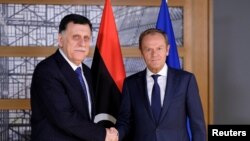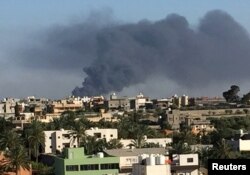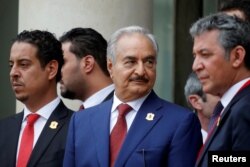European Union foreign ministers are calling for an immediate cease-fire in Libya and for the warring parties in the strife-torn North African state to return to negotiations to resolve their differences.
Meeting in Brussels Monday, the ministers warned that the fighting raging around Tripoli, which began last month when forces loyal to the country's would-be strongman, Khalifa Haftar, launched an assault on the Libyan capital, threatens international peace and security.
Their call for a cease-fire came as local reports mounted of rival regional powers stepping up their supplies of arms to the warring parties.
In a statement, EU foreign ministers urged “all parties to immediately implement a cease-fire and to engage with the United Nations to ensure a full and comprehensive cessation of hostilities.”
But to the frustration of the U.N.-backed government of Prime Minister Fayez al-Serraj, the EU ministers noticeably didn’t call on Haftar’s self-styled Libyan National Army (LNA) to withdraw to positions occupied before an offensive on the Libyan capital was launched on April 4.
The notable omission — previously the EU had been calling on the Gadhafi-era general to withdraw his forces from the outskirts of Tripoli — is being taken by Haftar’s supporters as a diplomatic win for the LNA and as an indication that European support for Fayez al-Serraj is weakening.
The EU ministers’ statement, according to Sami Zaptia, an analyst and owner of the English-language newspaper Libya Herald, “failed to call on Haftar to return his forces to their point of origin and equated Haftar with Serraj, which Serraj had requested the international community not do.” The ministers also didn’t offer the unequivocal condemnation that al-Serraj has been seeking of Haftar’s month-long assault on Tripoli.
The internationally-recognized al-Serraj, who’s backed by a loose alliance of battle-hardened militias from the capital and nearby town of Misrata, has been touring European capitals in recent days trying to shore up support in the face of an offensive that derailed already struggling U.N.-mediated peace talks.
Al-Serraj's tour came in the wake of signs that U.S. President Donald Trump might be considering reversing Washington's support for the Tripoli government. In a phone call last month with Haftar, the U.S. leader praised the general for his fight against Islamic State and other jihadists.
Bloomberg News reported Trump told Haftar he supported an attack on Tripoli.
State Department officials have told VOA that U.S. policy remains the same: Only a negotiated settlement can end conflict in Libya. Before Trump spoke with Haftar, U.S. Secretary of State Mike Pompeo had called for a cease-fire and for Haftar’s forces to withdraw from Tripoli.
More than 440 people have died and tens of thousands displaced since Haftar ordered his forces to march from the east of the country to Tripoli, according to U.N. officials. The attack on Tripoli is the latest serious flare-up of violence in a country that has struggled to establish stability and end lawlessness since the ouster in 2012 of Col. Moammar Gadhafi in a NATO-backed popular uprising.
Since Gadhafi’s toppling and death on a desert road outside the coastal city of Sirte, Libya has seen a series of governments fail to piece together the fractured country. The current conflict is pitching forces loyal to the Tripoli-based Government of National Accord and Haftar, who’s aligned with a rival administration in Libya’s east.
The former Gadhafi general, who broke with the autocrat and lived in exile in the United States for many years, has the backing of the United Arab Emirates, Egypt, Russia and Saudi Arabia, all of whom reportedly have supplied arms, ammunition, aircraft and drones. Haftar claims his opponents in Tripoli are militant Islamists, jihadists and terrorists — a claim firmly rejected by supporters of the GNA.
The GNA has the backing of Turkey and Qatar.
Local reports suggest there has been a noticeable increase in flights in recent days from Istanbul and Ankara to Misrata and from the Gulf to eastern Libya.
Mohamed Eljarh, an analyst at the Atlantic Council's Rafik Hariri Center for the Middle East, tweeted on Tuesday: “Turkey/Qatar on one side & UAE/Saudi Arabia on the other stepping up their efforts in #Libya to support their respective partners/proxies in the Libyan conflict. weapons/ammunition continue to flow, drone technology supplied + frequent unscheduled flights on all sides.”
The flow of arms into Libya contravenes a U.N. embargo imposed in February 2011 on Libya.
Ghassan Salame, the United Nations' special envoy for Libya, briefed the EU Foreign Affairs Council on Monday about the situation in Libya. U.N. spokesman Farhan Haq told reporters in New York that “Salame stressed that more than a month after the outbreak of fighting, it is becoming clear to everyone that a military solution cannot replace a political solution, and that it is high time now to return to the negotiating table.”
He said the U.N. remains “extremely concerned about the mounting impact of the fighting on civilians in and around Tripoli.” Haq said, “Nearly 67,000 people have now been driven from their homes, while an estimated 100,000 more people are thought to remain in front-line areas.”









